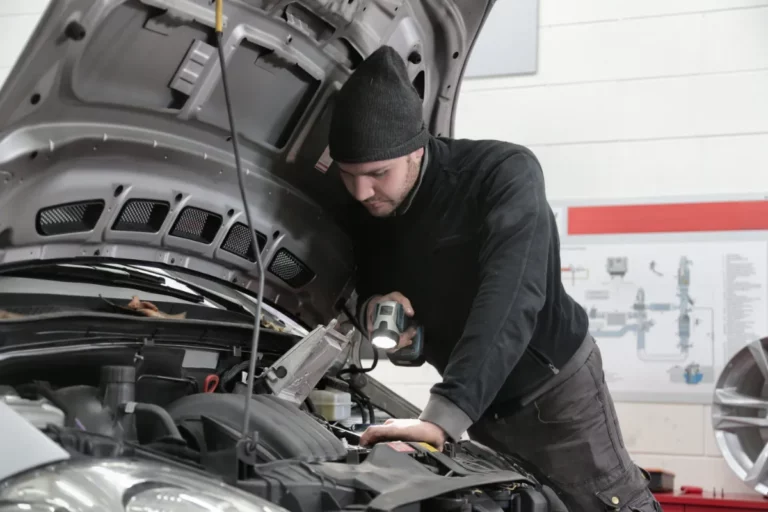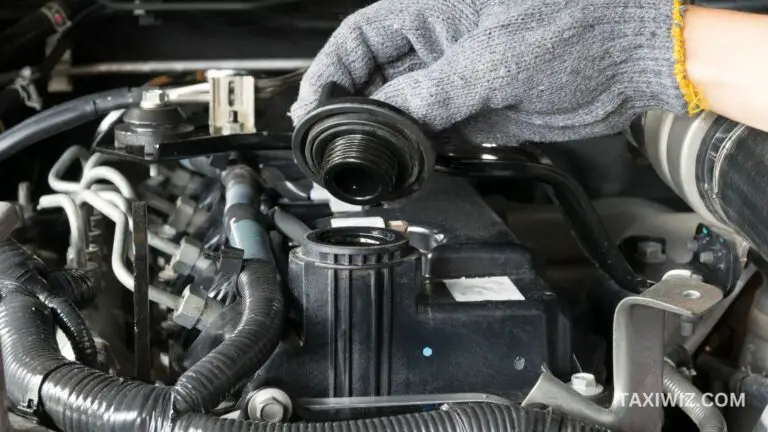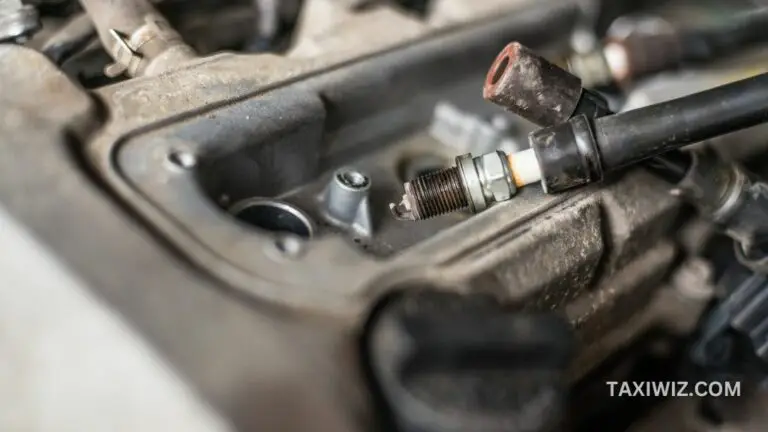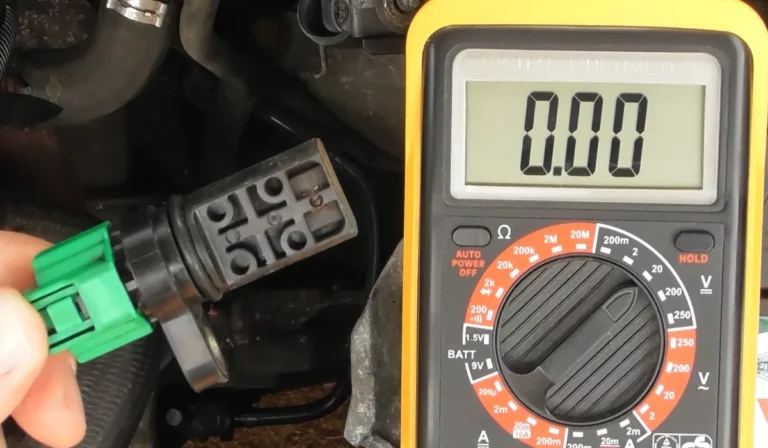Car Sputters When Air Conditioner Is On
Have you been noticing that your car sputters when the air conditioner is on?
When the air conditioner is activated, it increases the engine’s demand for power, potentially causing issues like insufficient fuel delivery or ignition problems, leading to engine sputtering.
While it’s normal to assume there must be something wrong with the engine itself, you’ll be surprised to learn that there are multiple factors that can trigger this issue.
The reasons can vary from overfilled AC system, carbon buildup, bad belts, and many more.

Why Your Car is Sputtering When Air Conditioner Is On
Down below, you will find the top 12 reasons that can lead to your car sputtering when the air conditioner is on:
Overfilled AC System:
If the AC system is overfilled with refrigerant, it can lead to excessive pressure within the system.
This can strain the compressor and cause the engine to sputter. Overfilling typically occurs when the system is serviced incorrectly, and it’s important to ensure that the refrigerant levels are properly balanced.
Faulty AIC Valve:
The AIC (Air Idle Control) valve regulates the engine’s idle speed. If the AIC valve becomes faulty or gets clogged with dirt and debris, it may not function properly.
As a result, the engine’s idle speed may fluctuate or become unstable when the air conditioner is turned on, leading to sputtering.
Carbon Buildup:
Over time, carbon deposits can accumulate on various engine components, such as the intake valves, throttle bodies, or fuel injectors.
This carbon buildup can disrupt the air-fuel mixture and hinder the combustion process. When the air conditioner is activated, it can exacerbate the issue, resulting in engine sputtering.
Corrupted AC Cycling Switch:
The operations of the AC compressor are controlled by the AC cycling switch. If the switch fails to work properly, it may not engage or disengage the compressor effectively.
This can lead to the compressor not working continuously or not engaging at all, affecting the engine’s performance and leading to sputtering.
Bad Belt:
The belt that drives the AC compressor can wear out or become loose over time. If the belt slips or fails to provide sufficient power to the compressor, it can lead to inadequate cooling performance and engine sputtering.
Regular inspection and maintenance of the belt are necessary to ensure its proper functioning.
Failing AC Compressor:
A failing AC compressor can cause various issues, including engine sputtering. As the compressor deteriorates, it may produce excessive friction or create drag on the engine, affecting its performance.
Additionally, a failing compressor can introduce debris into the AC system, which can further impact engine operation.
Low Refrigerant:
Insufficient refrigerant levels in the AC system can result in reduced cooling capacity. As the compressor cycles more frequently to compensate for the low refrigerant, it can strain the engine and cause sputtering.
Regular AC system maintenance, including checking and replenishing refrigerant levels, is essential to avoid this issue.
Adjust Idle Speed:
The idle speed of the engine is set to a specific value to ensure smooth operation.
However, if the idle speed is not properly adjusted, it may become too low or too high when the air conditioner is turned on. This imbalance can result in engine sputtering and may require idle speed adjustment.
Problems with the Distributor and Ignition:
The distributor and ignition system are crucial for the proper timing of spark plug firing and combustion.
If there are issues with the distributor cap, rotor, ignition coil, or spark plug wires, it can lead to misfires and sputtering, especially when the air conditioner places an additional load on the engine.
Dirty Throttle Body:
The throttle body is in charge of controlling the airflow into the engine. If it becomes dirty or clogged with carbon deposits, it can restrict the airflow and disrupt the air-fuel mixture.
When combined with the increased load of the air conditioner, it can cause the engine to sputter. Regular cleaning and maintenance of the throttle body are important to prevent this issue.
Faulty Condenser or Cooling Fan:
The cooling or condenser fan is responsible for cooling the engine and the AC condenser.
If the fan malfunctions, it can hinder proper cooling, leading to engine overheating and sputtering. Additionally, a faulty fan can impact the AC system’s performance, affecting the engine’s operation and causing sputtering.
Air Filter Problems:
The air filter’s job is to prevent contaminants, dust, and debris from entering the engine’s combustion chambers. In case the air filter becomes dirty or clogged, it can restrict the airflow into the engine.
This restriction, combined with the added load of the air conditioner, can disrupt the air-fuel mixture and combustion efficiency. As a result, the engine may experience sputtering.
Related Post: Should the Radiator Fan Turn on When AC is on?
What Is The Connection Between Engine Surging And The Operation Of The Car’s Air Conditioning System?
Unfortunately, there isn’t one specific system that can be held responsible for this issue to happen – it’s a mixture of various factors.
Now, the operations of a vehicle’s air conditioning system are closely connected to the engine.
This is because once you turn on the AC, it increases the engine’s power demand, causing fluctuations in the RPM also known as engine surging.
Engine surging takes place when the vehicle’s computer makes a miscalculation in the amount of power needed and overshoots.
Factors like insufficient fuel delivery, ignition system problems, AC compressor issues, and low refrigerant levels can also contribute to engine surging when the air conditioning is in use.
The EGR valve also has the potential to trigger surging if it experiences a buildup of carbon within any part of the system.
Making sure regular maintenance and addressing underlying issues are crucial to prevent engine surging while using the air conditioning.
Related Also: Why Is Fog Coming Out Of AC Vent In Car?
Frequently Asked Questions [FAQs]
Can a weak electrical system affect engine performance and cause sputtering?
Yes, if the car’s electrical system is compromised due to a weak battery, loose connections, or a faulty alternator, it may struggle to power both the engine and the air conditioner simultaneously – which results in sputtering to occur.
Are spark plug issues related to engine sputtering when the air conditioner is on?
Dirty or worn-out spark plugs can lead to weakened ignition and incomplete combustion, especially when the air conditioner is activated. This can cause the engine to sputter.
Can a faulty EGR (Exhaust Gas Recirculation) valve cause an engine sputter?
A malfunctioning EGR valve can lead to an improper air-fuel mixture, affecting engine performance and potentially causing sputtering especially under the added load of the air conditioner.
How does a clogged catalytic converter relate to an engine sputtering with the air conditioner on?
The clogged catalytic converter can restrict exhaust flow, leading to increased backpressure and reduced engine performance, potentially resulting in sputtering when the air conditioner is activated.
Is a vacuum leak a possible cause of engine sputtering when the air conditioner is on?
Yes, a vacuum leak can disrupt the air-fuel mixture, leading to an imbalance and potential engine sputtering, especially under the increased load of the air conditioner.
Can a malfunctioning oxygen sensor (O2 sensor) cause engine sputtering?
A faulty O2 sensor can provide incorrect feedback to the engine control unit (ECU), leading to improper fuel mixture and potential sputtering, especially when the air conditioner is in use.






